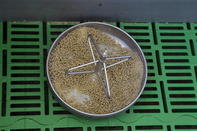Constipation
Constipation usually occurs in late pregnant sows, with possible signs including hard dry faeces, a humped back or pigs straining and groaning in pain while passing faeces with little or no production.

Treatment
Constipation can be prevented by increasing the dietary fibre in the ration. A couple of weeks before farrowing, green feed and/or bran, could be added to the feed to prevent sows from becoming constipated.
Care should also be taken to ensure pigs always have access to enough water. The American Pig Association advises farmers to treat constipated pigs by giving them a mixture consisting of a quarter apple, prune or cranberry juice with ¾ of water. Adding pumpkins or fruit to the diet will also help.
Organ Displacement
Organ displacement may occur at any age, but usually, affect sows after farrowing or growers when they weigh between 25 kg and 100 kg. Intestines of piglets may also become displaced or twisted if they suffer from severe diarrhoea. Affected pigs will usually have a swollen belly, often with a protruding rectum. The affected organ will swell and may rupture, resulting in severe pain, shock and rapid death.
During the post-mortem, the affected organ, usually the spleen, stomach or liver, will be enlarged and there will often be blood in the abdominal cavity. According to the NADIS Animal Health Skills, organ displacement may be caused by overeating, winter feeding of fermentable wet feed, erratic feeding, high-density diets or colitis.
Treatment
Good management and control of feed intake will help to prevent organ displacement. To prevent organ displacement, the South African Pork Producers Organisation in their production manual, Pigs for Profit, suggests farmers feed their pigs three times a day to avoid excessive excitement at feeding times and to keep sows calm to avoid them jumping up quickly after farrowing. Diarrhoea should be treated and prevented as far as possible.
Rectal Prolapse
With rectal prolapse, the rectum will be protruding from the anus. The condition is usually seen in young pigs. According to Pig for Profit, it may be caused by abdominal pressure or straining, often as a result of excessive huddling and piling up by young pigs in winter. Poisons, such as mycotoxins caused by mould in the feed may also predispose pigs to the condition.
Treatment
Affected pigs should be isolated and be given wet food if possible. Pigs for Profit warns that farmers should not try to remove or replace the part of the rectum that is hanging out: “It usually slough off, leaving a constricted but functional opening.” The slaughter weight of the pigs will be negatively affected.